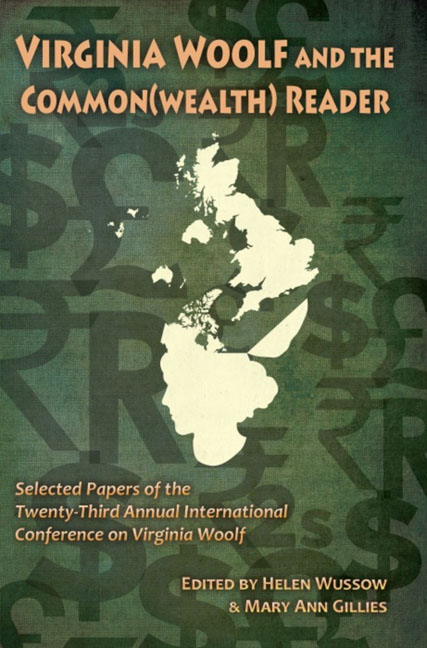Book contents
- Frontmatter
- Contents
- Introduction to Virginia Woolf and the Common(wealth) Reader
- Acknowledgments
- List of Abbreviations
- Invocations
- Networks of Affiliation: Foundations and Friends
- Woolf and the Commonwealth
- 1930s Onwards
- War, Peace, Internationalism: Bloomsbury Legacies
- “Caterpillars of the Commonwealth Unite”: Photography and Trauma in Three Guineas
- “Drawn from Our Island History”: Virginia Woolf, Nancy Mitford, and the Politics of Pageantry
- A ”Bloodless and Pernicious Pest”: The Middlebrow's “Common Man” in the Essays of Virginia Woolf
- Woolf's Troubled and Troubling Relationship to Race: The Long Reach of the White Arm of Imperialism
- Woolfian Seamarks: Commodified Women and the Racial Other on the Shores of Empire
- Documenting Fascism in Three Guineas and The Handmaid's Tale: An Examination of Woolf's Textual Notes and Scrapbooks and Atwood's “Historical Notes”
- Proportion, Conversion, Transition: War Trauma and Sites of Healing in Virginia Woolf's Mrs. Dalloway and Leslie Marmon Silko's Ceremony
- Woolf Beyond the Book
- Notes on Contributors
- Conference Program
Woolfian Seamarks: Commodified Women and the Racial Other on the Shores of Empire
from 1930s Onwards
- Frontmatter
- Contents
- Introduction to Virginia Woolf and the Common(wealth) Reader
- Acknowledgments
- List of Abbreviations
- Invocations
- Networks of Affiliation: Foundations and Friends
- Woolf and the Commonwealth
- 1930s Onwards
- War, Peace, Internationalism: Bloomsbury Legacies
- “Caterpillars of the Commonwealth Unite”: Photography and Trauma in Three Guineas
- “Drawn from Our Island History”: Virginia Woolf, Nancy Mitford, and the Politics of Pageantry
- A ”Bloodless and Pernicious Pest”: The Middlebrow's “Common Man” in the Essays of Virginia Woolf
- Woolf's Troubled and Troubling Relationship to Race: The Long Reach of the White Arm of Imperialism
- Woolfian Seamarks: Commodified Women and the Racial Other on the Shores of Empire
- Documenting Fascism in Three Guineas and The Handmaid's Tale: An Examination of Woolf's Textual Notes and Scrapbooks and Atwood's “Historical Notes”
- Proportion, Conversion, Transition: War Trauma and Sites of Healing in Virginia Woolf's Mrs. Dalloway and Leslie Marmon Silko's Ceremony
- Woolf Beyond the Book
- Notes on Contributors
- Conference Program
Summary
Although not used by Virginia Woolf herself, the word “seamark” in my title seems most relevant to her writing since in it sea metaphors not only abound but enact distinctive thalassic aesthetics and politics (Muscogiuri 101-107). According to the definition given by the OED, “seamark” designates “a conspicuous object distinguishable at sea which serves to guide or warn sailors in navigation” (“Seamark”). My use of the term is meant to capture what I perceive as the significance of Woolf's artistic-poetical deconstruction of a number of dominant discourses: on the one hand by redefi ning H.D.'s notion of “signposts” (47), which refers to fresh writing as a possible guide in the chaotic sea of life and, with greater emphasis, on the other hand, on the additional meaning of “warning” that the word “seamark” holds—a warning about the danger of shipwrecking in those waters, of ending up “at the bottom of the sea” (just like Rachel perceives herself during her illness in The Voyage Out) when succumbing to the othering nature of those discourses, for not having been able to recognize them (416).
Woolf's inscription of sea metaphors is in part connected with the question of perspective, especially in her treatment of the coast. Often in Woolf, that liminal, borderline space between sea and land reveals alternative readings of history—or rather, of a his-story (the one recorded by an inherently masculinist offi cial historiography), which is the product of the phallogocentric politics that Woolf and other writers metaphorically associate with the land, although they certainly do extend over seawaters, in line with the imperialist imperative of “Rule, Britannia, rule the waves!” (Thomson 602). Indeed, the subject of this paper could also be described as Woolf's coastal visions of “history against the grain” (Benjamin 257); specifically, those coastal visions of Woolf's (in The Voyage Out and The Waves) pivoting around the nexus between colonialism, gender, race, and imperialism. In particular, I want to look at how her writing lets emerge a perception of woman as one of many different others whose identity and dignity as human beings are denied by the othering process of patriarchal imperialism.
- Type
- Chapter
- Information
- Virginia Woolf and the Common(wealth) Reader , pp. 173 - 182Publisher: Liverpool University PressPrint publication year: 2014



